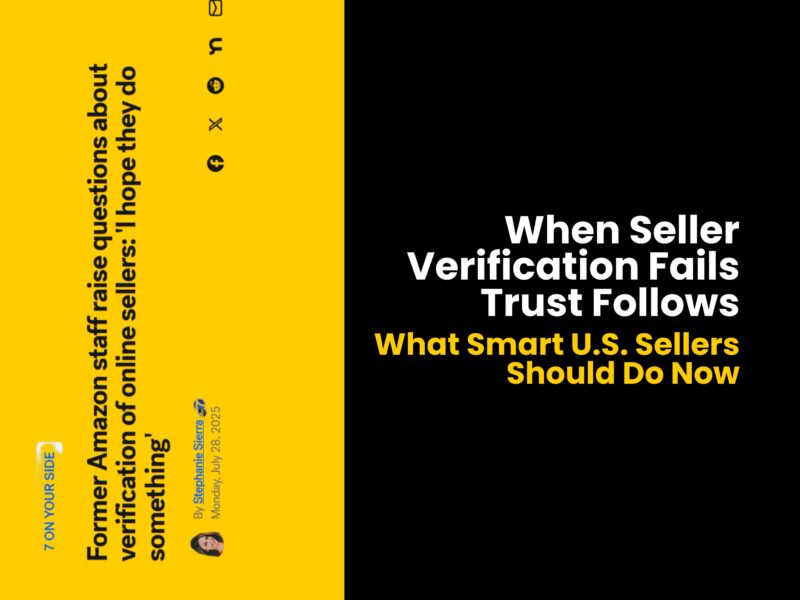Why recent reporting on overseas seller verification matters and the exact plays AYS QUEST recommends to protect growth and win market share.
Local reporting shows gaps in how Amazon verifies overseas sellers, which has led to real consumer frustrations and potential marketplace risk. This is both a warning and an opportunity: U.S. sellers who emphasize compliance, trust, and listing quality can win more customers and convert skeptics while dodging the headaches that come from weak verification. (ABC7 San Francisco)
What the ABC7 story found?
ABC7’s reporting highlights that former Amazon employees say verification for overseas sellers has weaknesses — for example, sellers registering foreign accounts but listing local U.S. addresses, or address info being updated without strong follow-up. These gaps have sometimes produced alarming consumer incidents (unwanted returns or packages sent to people who didn’t authorize them). In short: verification rules exist, but enforcement and follow-up have room for improvement.
At the same time, Amazon’s Seller Identity Verification (SIV) process requires government ID, business documents, and may include video checks the policies are strict on paper, but operational friction and loopholes remain in practice.
Amazon has also publicly pressured sellers to complete identity verification steps or risk account restrictions — showing that the company is trying to tighten things, even if problems persist.
Why this matters to U.S. sellers?
- Trust becomes a differentiator. When shoppers doubt a seller’s legitimacy, they avoid clicking. If you make trust visible (clear identity, US-based service signals, fast returns), more customers will choose you over a cheaper but sketchy-looking alternative.
- Bad actors create category friction. Low-quality sellers who game verification damage conversion rates for entire categories. Cleaner competitors see higher conversion when scams and returns drop.
- Regulatory and platform pressure tends to favor compliant sellers over time. As platforms update verification and enforcement, compliant sellers face fewer bad-actor competitors in the long run.
What smart U.S. sellers should do right now practical checklist?
These are things your store or catalog manager should complete in the next 14–30 days.
Trust & Identity
- Show clear contact information: a US support email, an easy-to-find returns address (or returns policy), and a phone number.
- Add trust signals: A+ content, brand story, “ships from USA” when applicable, and highlighted warranty/guarantee language.
- Make a verification page: a short “About & Safety” page in the storefront describing your compliance, shipping standards, and customer care.
Listings & Conversion
- Audit listings that have high impressions but low conversions these are where suspicious sellers create category noise. Improve images, bullets, and key benefits.
- Add robust return and warranty language in your product pages to reduce buyer anxiety.
Ads & Traffic
- Increase spend on high-converting SKUs where you already have good reviews and conversion rates convert the wary shoppers who will avoid low-trust listings.
- Use Sponsored Brands to drive traffic to a branded Storefront (not a single product page) this reduces the chance shoppers are lost to low-trust adjacent listings.
Operations & Compliance
- Keep clean, up-to-date business documents ready (tax, company registration, shipping contracts) in case of platform requests.
- Track inbound returns and fraud patterns closely; if you see an uptick from suspicious buyers, pause targeted ad spend until the situation stabilizes.
Longer-term plays that protect growth
- Invest in brand-building: A+ content, comparison charts, and clear “why buy from us” narratives convert cautious shoppers.
- Build customer care as a growth lever: fast replies, easy returns, and a small post-purchase outreach program increase lifetime value and reviews.
- Monitor category health: keep a 30/60/90 day watch on top competitors if you see suspicious behaviour (strange pricing swings, thousands of tiny sellers flooding a category), allocate a small research budget to investigate. AYS QUEST can do this monitoring for you.
How AYS QUEST can help?
At AYS QUEST we help sellers turn trust into market share: verification-ready listings, ad funnels that favor trusted SKUs, and operational checks that prevent returns and fraud from eating your margins.
If you want a quick win, we’ll run a free 15-point Trust & Performance audit for one of your ASINs no obligation. We’ll show you where suspicious competitors are hurting conversion and give three tactical fixes you can implement in 7 days.
Final thought be the obvious safe choice
Stories about verification gaps make headlines but they also create an opening. Shoppers who saw the headlines will prefer sellers who look professional, responsive, and clearly legitimate. Make it easy for them. Clean listings, transparent policies, and smart ad spend will win the next wave of customers who want reliability over roulette.
If you want that 15-point audit or a short playbook for the next 90 days, tell me which ASIN or category you want us to analyze we’ll prepare the checklist and three prioritized actions in 48 hours.
ABC7 report on verification concerns; Amazon Seller Central guidance on global seller identity verification; Business Insider coverage of Amazon’s identity-verification enforcement.





